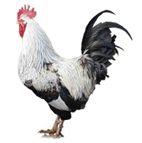|
Food
Chickens are
pretty omniverous, I’ve even heard of one that specialised in
catching mice, but it is very important for the chickens health to have a
balanced diet. Unless you are very expert, the best way to
achieve this is to base your chickens’ diet on one of the
propriety pelleted feeds. This can be fed in conjunction with
suitable grain such as corn or wheat, the consensus of opinion
being to feed the pellets in the morning via a protected feeder
(it’s important to keep the food dry), then the grain in the
afternoon as a scatter food.
Feed at a rate which
allows a little left over at the end of the day, which will
assure you that every bird is getting enough. Fresh greens are
very popular with the birds and certainly of benefit (yolks
won’t be yellow without them, unless you add a dye to the food,
like many commercial egg producers). If you can't get your birds
onto grass regularly give them some cabbage or similar.
Once you’re sure the birds
are properly nourished a few treats will do no harm and be much
appreciated: kitchen scraps such as bread and cereal for
example, or sunflower seeds.
Drink
It is important for the health of your chickens health to provide fresh, clean water which must be available during the daylight hours.
This is best achieved by one of the propriety drinking fountains
which keep a reserve of clean water which fills up a small
trough, making it harder for the water to be fouled. If you lock
your birds in at night, it is not necessary to make water
available.
Grit
Hens need (flint) grit to grind food in their crop. Some will be
included in a good quality food, but its a good idea to supply
some in a suitable container. Also in the food will be a source
of calcium, necessary for eggshells, but many poultry keepers
like to supply extra in the form of ground oyster shell, usually
mixed in with the grit.
Cleaning
The chicken house will need to be cleaned regularly, exactly how
often depending on the density of birds and the time of year,
but ideally once a week. The floor of the chicken house should
be covered with sawdust, though this is a misnomer: it is very
important that it should be dust-free wood shavings as chickens
have delicate respiratory systems. For the same reason clean,
dry wheat straw, not hay, should be used in the nesting boxes,
preferably on a layer of sawdust. The floor can be lined with
old newspaper first, then sawdust, droppings and all can simply
be rolled up. Even easier if your poultry house has sliding
floors.
Poultry droppings make one
of the best garden manures, though used fresh and direct, in
quantity, can be too strong for plants so best allow them to rot
down with the old straw and sawdust – it really shouldn’t smell.
It is very important to keep all the crevices clean and watch
for signs of infestation by red mite or fleas.


|





